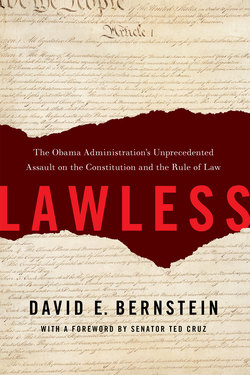Читать книгу Lawless - David E. Bernstein - Страница 11
На сайте Литреса книга снята с продажи.
ОглавлениеChapter 3
A LEAVE OF ABSENCE FROM THE “REPUBLIC OF CONSCIENCE”
THE OBAMA ADMINISTRATION has been a huge disappointment to those who hoped President Obama would reverse the trend of presidents usurping more and more authority over foreign and military affairs. The Constitution provides only a broad, vague outline of presidential authority in these areas. The president gets to negotiate treaties (which then must be approved by two-thirds of the Senate) and is the commander-in-chief of the armed forces. Congress, meanwhile, has the exclusive power to declare war and to pass legislation regulating international trade.
The Constitution does not directly address any number of situations. For example, it does not say under what, if any, circumstances the president may, without Congress’s consent, send armed forces into harm’s way in a situation that does not amount to a formal state of war with another country.1 Most scholars of the original meaning of the Constitution believe that the president was supposed to have only very limited authority to use armed force abroad without congressional consent. But for the last one hundred years or so, presidents have been sending soldiers to battle on their own say-so with very little pushback from Congress and the courts. Meanwhile, the Supreme Court has often suggested that the scope of a current president’s power is defined in part by what his predecessors did.
Just about everyone acknowledges that the ultimate constitutional check on presidential authority was supposed to be Congress’s authority to refuse to appropriate funds for the president’s initiatives, the so-called power of the purse. The power of the purse worked reasonably well in America’s early days, when the federal government was limited in scope and the president had to beg Congress for money before he could engage in major military action abroad.
Today, however, the power of the purse is no longer an effective constraint on the president, because the president has many ways to evade Congress’s control over military appropriations.2 Presidents have learned to use accounting tricks and loopholes to move funds Congress approved for one purpose over to a purpose Congress has not approved at all. Because of such manipulations, Congress never got the opportunity to decide whether to use its power of the purse to stifle US intervention in Libya in 2011. The Obama administration paid for that conflict entirely out of funds reallocated from other Defense Department accounts.3
The authors of the Constitution expected that Congress as a whole would be motivated to preserve its authority against presidential encroachment. The Founding Fathers, however, did not anticipate the development of our two-party system. At any given time around half the members of Congress belong to the same party as the president, and do not want to limit “their” president’s authority.4 Congress is therefore not likely to make a serious effort to close loopholes and forbid accounting tricks anytime soon.
Even if Congress did make more of an effort to use its power of the purse, it would not necessarily constrain the president. In 2014, Congress passed a law banning the president from using any Defense Department funds to release prisoners from Guantanamo Bay, Cuba, without giving Congress thirty days’ notice. President Obama nevertheless traded five high-ranking Al Qaeda prisoners for captured US soldier Bowe Bergdahl without the required notice. This action blatantly violated both the 2014 law and the Antideficiency Act. The latter law forbids federal agencies to spend funds “in excess or in advance of amounts that are legally available.” The nonpartisan Government Accountability Office concluded that the Obama administration violated a “clear and unambiguous law.”5 The administration floundered for a rationale for breaking the law, and never gave an entirely coherent explanation.
